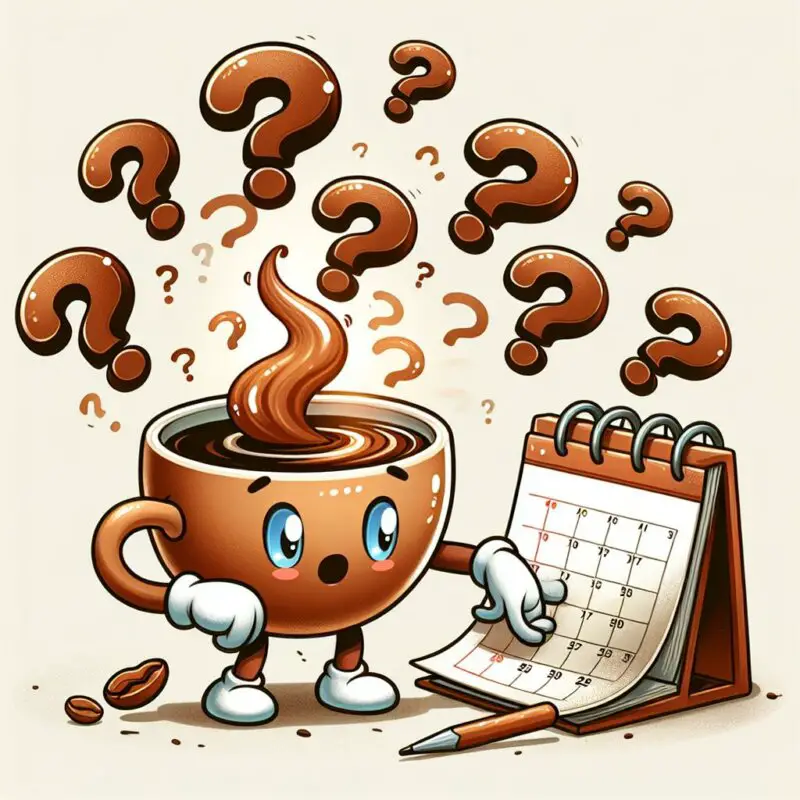This post may contain affiliate links. Please read my disclosure for more info.
We love coffee for its taste and the energy kick it gives us. It’s perfect for powering through work but not so great if it messes with our sleep. Ever wonder how long that coffee buzz lasts?
An hour after enjoying your coffee, the caffeine hits its peak, making you feel the most alert. By six hours, this buzz cuts in half, and in about ten hours, it fades away—unless you’re sipping on a lot of caffeine throughout the day.
In this post, we’ll explore how caffeine impacts you, how quickly its effects fade, and all the ways caffeine sneaks into your diet, boosting your morning coffee’s kick.
What Foods and Drinks Contain Caffeine?
Coffee isn’t the only caffeine source! You’ll also find this energy booster in soft drinks, energy drinks, and even your favorite chocolate treats.
Drinking more caffeine means it stays in your system longer. Be mindful of all the ways you’re getting your caffeine fix!
- Coffee — 95 mg per cup
- Energy drinks — 85 mg per cup
- Instant coffee — 60 mg per cup
- Espresso — 64 mg per shot
- Black tea — 47 mg per cup
- Green tea — 28 mg per cup
- Cola — 22 mg per cup
- Diet cola — 30 mg per cup
- Dark chocolate — 24 mg per ounce
- Decaf coffee — less than 4 mg per cup
How Does Caffeine Affect the Body?
Positive effects of caffeine
- Increased energy
- Improved cognitive function, focus, and alertness
- Enhanced physical performance
- Improved mood
- May help you lose weight
- May protect against dementia, Alzheimer’s Disease, and cognitive decline
- May help prevent type 2 diabetes, Parkinson’s disease, and liver disease
- May reduce mortality rate in diabetes patients
Negative effects of caffeine
- The coffee jitters — an anxious, nervous, shaky feeling
- Headaches and dizziness
- Insomnia
- Dehydration
- Diarrhea
- Nausea
- Increased blood pressure
- Rapid heart rate and abnormal heartbeat
How Much Caffeine Is Too Much?
The FDA suggests keeping it at 400 mg of caffeine daily for most adults. That’s about four cups of your regular coffee. But, watch out! Some extra-strong coffees pack that entire punch in just one cup.
Some folks feel the kick of caffeine more than others. If you’re super sensitive, just one cup might leave you shaking. Your best bet? Quitting or going for decaf instead.
If you’re pregnant or breastfeeding, aim for no more than 200 mg of caffeine daily. When you enjoy a cup of coffee, remember about 1% of that caffeine ends up in your breastmilk, hitting its peak about an hour later. Tiny newborns struggle to process caffeine, which can linger in their tiny bodies 10–20 times longer than in us adults. Keep it simple and safe for both of you!
How Long Does It Take for Caffeine to Kick In?
Did you know caffeine starts working in just 15 minutes? That’s super fast! So, if you sip your coffee quickly, you might feel a strong buzz even before finishing your first cup. Keep that in mind next time you’re enjoying a brew!
About an hour after your coffee, caffeine hits its peak in your system. That’s when you feel the most buzzed and awake. Around the same time, you might notice you need to use the bathroom more. That’s because caffeine also makes you pee more.
How Long Does Caffeine Stay In Your System
An hour after your coffee, the buzz fades. But, the time it takes to fully wear off? That depends on how much caffeine you sipped.
Half of the caffeine you drink takes five hours to leave your body. Learn more about its half-life here.
Imagine you drink coffee with 400 mg of caffeine. Five hours later, half of it, 200 mg, is still in your system. Wait another five hours, and you’ve got 100 mg of caffeine lingering.
If you sip on four cups of coffee at 8 AM, catching those Z’s at 10 PM might be a struggle. Why? Because it’s like you’ve got almost an entire cup’s caffeine still zooming around in your body!
Research shows that to sleep well, it’s best to skip caffeine 6 hours before bed. Love a post-dinner coffee? Opt for decaf to keep your sleep sweet. Learn more about how caffeine affects your zzz’s.
The Symptoms of Caffeine Withdrawal
If you’re thinking of reducing your caffeine intake, take it slow. The more coffee you drink, the more your body might rely on it. Gradually cutting back helps avoid withdrawal symptoms.
Cutting back or quitting coffee suddenly? Watch out for withdrawal symptoms like headaches, irritability, and fatigue.
- Tiredness
- Headaches
- Nausea
- Irritability
- Muscle Pain
- Difficulty concentrating
If you stop drinking caffeine, you might start feeling withdrawal symptoms 12–24 hours later. This happens as your body processes the leftover caffeine. If you drank a lot of caffeine, it might take a bit longer to feel these effects.
When you stop drinking coffee, you might feel off for 2 to 9 days. How rough it feels depends on how much coffee you usually have. More coffee means tougher withdrawal symptoms.
Caffeinate Safely
Caffeine affects everyone differently, yet it typically keeps you energized for a few hours.
Next time you’re picking between your go-to coffee k-cups and those extra strong ones, think twice. Sure, the boldest Starbucks coffees are tempting, but it’s wise to skip them later in the day. Your sleep will thank you!




